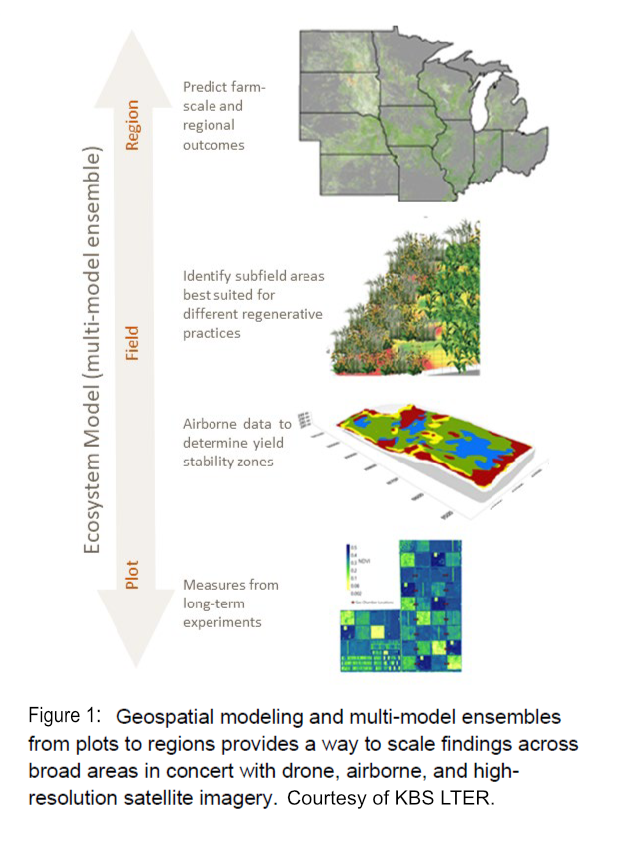Science Council Framework
May 10-12, 2023, Kellogg Biological Station
Theme: Spatial Scaling
Travel and lodging information will be
distributed to invited participants.
Recorded lightning talks will be available
after the meeting.
Much of the work that Long Term Ecological Research sites pursue addresses ecological mechanisms and is focused on a relatively local spatial scale. But for our work to have maximum value, we need to think about its relevance at broader scales. What aspects of our research are scalable? Where have we had successes and where do we struggle? Are we missing key types of information or partners that would improve the relevance of our research for scaling – or is some of what we do just not “scalable”?
Each of our sites may apply a variety of approaches – complex sampling schemes, modeling, repeated remote sensing, distributed experiments, synthesis. Our intention is not to examine each of these approaches in depth, but to think about the kinds of information we most often collect and identify how they are (or could be made) useful for researchers (ourselves or others) who want to apply them at broader scales.

If discussions come together well, we might emerge with a Perspectives-type article or a working group proposal that describes successes in scaling LTER-sourced data as well as identifying gaps or recommendations for modest changes.
A tentative outline for the paper would include the following sections and breakout discussion are organized to provide material for them:
- Introduction about the need for spatial scaling in long-term science,
- Approaches to scaling,
- Examples/case studies (perhaps from the core areas),
- Lessons learned and next steps, including gaps and opportunities (and perhaps things that just aren’t possible)
Everyone attending will have the opportunity to contribute to the paper or proposal, but attendance and discussion participation does not guarantee authorship. We will follow an adapted CRediT Framework in determining authorship.
As usual, we will kick off the meeting with 5-minute site lightning talks. As well as providing any major new site news, please focus your talk around a scaling success from your site (or possibly an interesting failure). Try to provide enough information to understand what worked well – and why.
Please plan on uploading slides (with at least minimal notes) by May 1, 2023. The NGA team will be joining us directly from their Spring cruise and will miss the live talks, but would like to have some chance to review them. We’ll be recording talks and sharing them on the LTER YouTube channel and will make general sessions of the meeting available virtually.
Breakout groups make up the heart of the science discussions and produce the best results with some leadership and a common set of questions to guide the discussion.
Breakout Session 1, topics:
- Primary production
- Carbon pools and transformations
- Nutrient pools and transformations
- Populations
- Disturbance
- Governance
- Human activity
Breakout session 1 discussion guide (90 minutes):
- What are some of our best examples of scaling in this are? (informs Approaches to SS)
- What made them work? (informs Case Studies/Opportunities)
- Is that consistently possible? If not, why not? (informs Lessons Learned/Gaps)
- What were the benefits or outcomes? (informs Need for SS/Lessons Learned)
- Were they more scientifically or societally relevant than the local research?
- What gaps do we see? How could they be reduced? (informs Lessons Learned)
Breakout session 2, topics:
- Introduction: need for spatial scaling in long-term science, what’s possible, what may not be
- Approaches to scaling,
- Examples/case studies (may need to break into subgroups)
- Lessons learned and next steps
- What opportunities are we missing?
- What partners would be most valuable in this area?
- Do they know about our work? What do we know about their work?
Breakout session 2 activity guide (90 minutes):
We aim to get a reasonable start on writing the paper or proposal in the second breakout session. Breakout groups will have access to a shared google doc to build an extended outline and will be able to reference (but should not edit) the other sections as they develop.
Following the meeting, we will provide an opportunity for all attendees to opt into continued discussion and writing.








